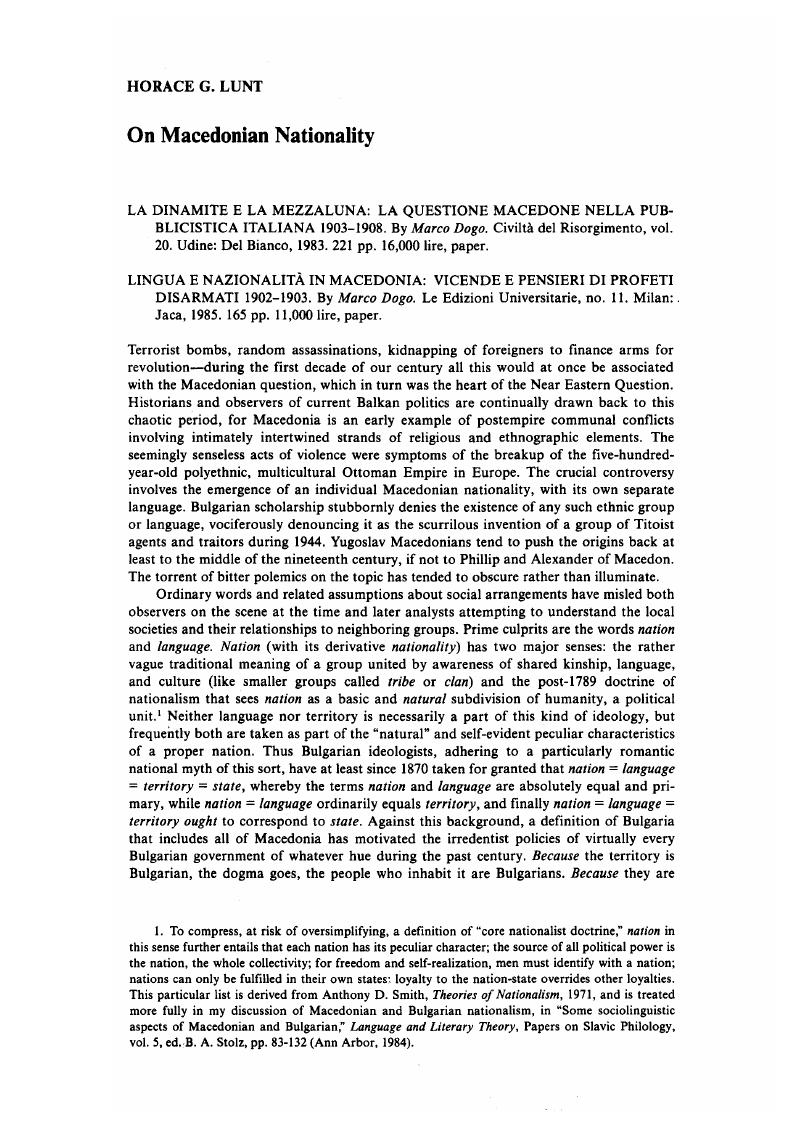Published online by Cambridge University Press: 27 January 2017

1. To compress, at risk of oversimplifying, a definition of “core nationalist doctrine,” nation inthis sense further entails that each nation has its peculiar character; the source of all political power isthe nation, the whole collectivity; for freedom and self-realization, men must identify with a nation;nations can only be fulfilled in their own states: loyalty to the nation-state overrides other loyalties.This particular list is derived from Anthony D. Smith, Theories of Nationalism, 1971, and is treatedmore fully in my discussion of Macedonian and Bulgarian nationalism, in “Some sociolinguisticaspects of Macedonian and Bulgarian,” Language and Literary Theory, Papers on Slavic Philology, vol. 5, ed. B. A. Stolz, pp. 83–132 (Ann Arbor, 1984).
2. In 1985 this doctrine was applied to ethnic Turks in Bulgaria—something over 9 percent ofthe populace; they were required to take “Bulgarian” names, and the use of the Turkish language inpublic was restricted if not altogether forbidden. See e.g. Baest, Torsten F., “Neues von der‘ein heitlichensozialistischen Nation': Die VR Bulgarien und ihre tiirkische Minderheit (1944–1985),” Ost-Europa Info, no. 61 (1985): 92–118 Google Scholar. This is available in English condensation in “Bulgaria's War atHome: The People's Republic and its Turkish Minority (1944–1985),” Across Frontiers 2, no. 2 (1985): 18–27, and also in State Department Report to the 2nd Session of the 99th Congress, Country Reports on Human Rights Practices for 1985, February 1986, esp. pp. 921–921, 930–934.
3. Note that the old view of nation, where the terms tribe and nation are essentially synonyms, became mixed up with the post-1789 political concept. The warm emotional closeness of the first sense (implied by traditional ethnic terms like Serb, Bulgar, Slav) was embodied in such works as the1762 Slavo-Bulgarian History by Paisi of Hilendar or, with additional romantic nuances derived from Herder, the 1861 Bulgarian Folksongs of the martyred Macedonian brothers Dimitar and KonstantinMiladinov. The fiery political imperatives of newer “blood and soil” (Blut und Boden, sang et sol) doctrines are added, confusedly and confusingly, in nationalist Bulgarian literature (and politics)after about 1850, for example, by Petko R. Slavejkov. Contemporary Macedonians try to keep thesenses separate, by no means an easy task, for geographical, ethnic, and political meanings blend tooeasily into one another. An example: Western European Slavists have been informed by irate Bulgarians that Yugoslav republications of the Miladinovs’ collections are entitled “Macedonian Folksongs.” This seems to be simple disinformation, for such a title is not used, and facsimiles of the original title page, including the epithet Bulgarian are routinely included. Macedonians, in turn, might accuse Bulgarian scholars of “Bulgarizing” the Miladinovs’ language, for example, by changing od to ot (on thetitle page, twice). What is “up-dating” or “normalizing” for one party is vile falsification for the other.
4. It should be noted that the geographical definition of Macedonia varies in time and also, intoo many cases, according to the political bias of the definer.
5. For specific details and pertinent literature, see Victor, A. Freidman, “The Sociolinguistics of Literary Macedonian,” International Journal of the Sociology of Language 52 (1985): 31–57.Google Scholar
6. Unfortunately, political force may disallow change or impose it, compare note 2.
7. Dogo's presentation is entirely compatible with the linguistic information detailed in my article (cf. note 1) and in Friedman's (cf. note 5).
8. Note that, of all the Christian Slavic inhabitants of “Greater Bulgaria” (defined by the short lived treaty of San Stefano, 1878), only the Macedonians felt it necessary to repudiate the labelBulgarian, though they allowed the super ordinate label Slav. The attitudes of Slavic-speaking Moslems and their roles in the conflicts of 1870–1945 are not dealt with in any of the literature I have seen.
9. The Hitler-backed Bulgarian occupation of Macedonia in 1941–44 also announced in effect: “You are our brother Bulgarians, but you are junior and ignorant; shut up and do as you are told!” This authoritarian intransigence turned even pro-Bulgarian advocates into separatists.‘
10. “Edna makedonska teorija,” Periodilesko spisanie 64 (1904): 780–833.
11. Bulgarian polemicists are forced to mention Misirkov and go to great lengths to denigratehis person and career and to ridicule his ideas; I find it odd that Teodorov-Balan's review is nevercited and welcome Dogo's references.
12. See my article, cited in note 1. For more details about nineteenth-century linguistic evidence of Macedonian individuality (including authors who do not necessarily reject the label Bulgarian), see now Trajko, Stamatoski, Borba za makedonski literaturen jazik (Skopje, 1986)Google Scholar.